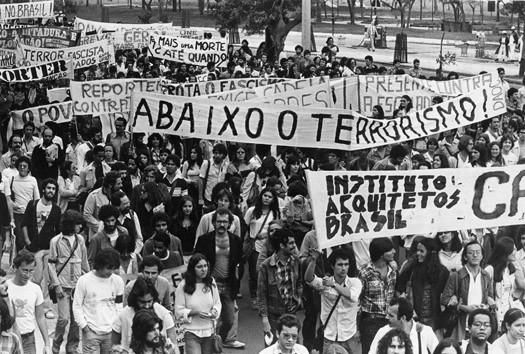Decades after dictatorship, Brazil has a new home for nearly one million pages of records of the past.
Led by Brazil’s Federal Public Ministry, the Public Archive of the State of São Paulo and the project Armazem Memoria, a group of 13 human rights organizations have created an online platform Brasil Nunca Mais Digital to preserve evidence and other documents related to more than 7,000 political prisoners tried before Brazil’s Military Supreme Court, during that country’s military dictatorship.
The documents in the archive range from 1964 to 1979, a time when Brazil’s military dictatorship suppressed trade unionists, political activists and resisters.
“Power in Brazil has been traditionally opaque, systematically hiding information about governmental abuse,” says Eduardo Gonzalez Cueva, director of ICTJ’s Truth and Memory program. “Brazil Nunca Mais is the first example of the disclosure of thousands of official records proving state terror. Such a step was the result of civil society taking action, at great risk; to ensure the right of citizens to know the truth about human rights violations.”
Between 1964 -85, thousands of political opponents were persecuted and brought before military courts to be sentenced, often on the basis of confessions extracted under torture. These cases were tracked and documented meticulously by Brazil’s Military Supreme Court in order to provide an aspect of legality to the repression. However, political prisoners took advantage of the processes to denounce torture and other abuses.
In 1979, after the military regime issued an amnesty law, lawyers for political prisoners were allowed to examine the records of the Military Supreme Court, a large group of documents that comprised official verification of the allegations of torture already made by their clients.
With the support of religious figures such as Cardinal Archbishop Paulo Evaristo Arns and Reverend James Wright; lawyers and specialists began secretly copying legal records documenting the use of torture against political prisoners.
Working covertly for six years, they photocopied approximately one million pages and compiled 543 rolls of microfilm of 707 cases from the Military Supreme Court. They found records on the number of prisoners officially charged with crimes, arrested, tortured, and disappeared, as well as information on the identity of torturers; torture methods and detention sites. A short volume summarizing the findings entitled Brasil: Nunca Mais became a bestseller after its publication in 1985. The findings were also published in Torture in Brazil Abroad.
In 2011, the Public Archive of the State of São Paulo and the Center for Research Libraries began digitizing the archives to preserve decaying documents and ensure broad, public access to the history of Brazil’s use of torture against dissidents.
As a portal into a vast archive of a dark chapter in Brazil’s history, Brasil Nunca Mais Digital offers advanced search functions to browse various categories, such as state or political organizations, and provides photo galleries, videos and an interactive timeline.
“As Brazil’s power and prestige grow, its government feels the pressure of civil society demanding more transparency and accountability,” said Gonzalez. “Responding to those demands is fundamental to secure Brazil’s place as a global leader.”
Photo courtesy of Brazil Amnesty Commission Archive
